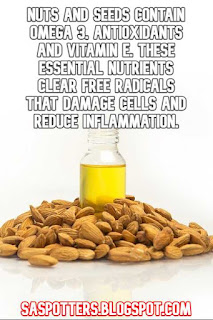This article is written by Sparkle Purpose. Follow Sparkle Purpose on Twitter and Pinterest.
Foods that slow down the aging process
It's important to keep your brain healthy and functioning. Brainstorming puzzles aren’t enough to keep your brain in top shape. They do help, but your brain also needs the right nutrients.
Every meal that you eat has a significant impact on your health. Almost every food that benefits your brain will also prevent premature aging and prolong the aging process.
Here are the foods that do both.
1. Turmeric increases lifespan
Turmeric has become very popular for its numerous health benefits. This spice offers a number of benefits for the brain, lungs, liver, digestive tract, skin and more.
Turmeric contains a very important ingredient called curcumin. This is basically the active ingredient in turmeric. It's what gives it its yellow-orange color.
Curcumin is able to cross the blood-brain barrier and enter into your brain to feed its cells.
Curcumin is an anti-inflammatory, antiseptic and antioxidant compound that has been linked to positive effects on the whole body.
Inflammation is thought to be a cause of all disease. Turmeric is as effective as many pain medications to reduce inflammation.
This may help to prevent, treat or slow down the progression of many diseases that can cut our lives short.
Curcumin has been a great help for people with Alzheimer’s disease.
It may also improve their memory. It does so by clearing the amyloid plaques - which are a characteristic of Alzheimer’s disease.
If you’ve been struggling with depression, drinking a turmeric latte may actually help.
Curcumin compounds in turmeric boost serotonin and dopamine. Both of these hormones are necessary to improve your overall mood. Depression is linked to a shortage of these important neurotransmitters.
There are cultures that strongly recommend drinking turmeric milk at night. It sounds like there’s actual benefit to this.
Your brain has a growth hormone called neurotrophic factor. It makes brain cells grow. Curcumin boosts this growth hormone and helps your brain cells to thrive.
Drinking turmeric tea can help you to keep your belly lean. We know that body fat - especially belly fat - is a major risk factor for cardiovascular disease.
Add a pinch of turmeric the next time you make mash potatoes. Maybe even add it to your smoothie. Your body will thank you later!
2. Pumpkin seeds improve your health
Pumpkin seeds are much more than tasty snacks to munch on. They also offer amazing health benefits for your brain and your body.
Their powerful antioxidants protect both your brain and body from the damage caused by free radicals. Free radicals are generated through oxidative stress.
Oxidative stress is the general wear and tear that our cells go through on a daily basis. It's what leads to cellular aging.
Antioxidants, like those in pumpkin seeds, help to counteract this process.
Pumpkin seeds are also rich in zinc, magnesium, iron, and copper. All of these minerals are essential for the healthy functioning of your body.
Zinc, magnesium and copper are extremely important for your health.
Zinc is particularly important for nerve signaling. Its deficiency has been found to cause a lot of diseases like Parkinson’s disease, Alzheimer’s disease and depression.
You'd be wrong if you thought that magnesium was less important. You need this mineral for good brain function in areas like memory and learning capacity. The deficiency of magnesium has been linked with depression, migraines, and epilepsy.
Eat more pumpkin seeds to increase your consumption of copper because it is also essential for a healthy body. Copper helps to control nerve signals and its deficiency may cause neurodegenerative diseases like Alzheimer’s.
One of the most important things that we all start to struggle with as we age is concentration. If you’ve been finding it difficult to concentrate or have regular brain fog, eat foods that are high in essential minerals like pumpkin seeds to prevent deficiency in these important elements.
3. Oily fish has nutrients that we need
Fatty fish or oily fish is a good source of omega-3 fatty acids. Sardines, salmon, and trout are particularly rich sources of omega-3.
About 60% of our brain is made of fat. Half of this is the omega-3 kind of fat. Omega-3 is used by the brain, heart, blood vessels and lungs to work properly.
This includes memory and learning. Omega 3 might also slow age-related mental decline besides preventing Alzheimer’s disease.
Include oily fish in your diet if you want to keep depression away. Studies have found that a lack of omega-3 may trigger symptoms of depression.
People who ate broiled or baked fish regularly had more gray matter in their brains. Gray matter plays a crucial role in your intelligence because it contains nerve cells that control memory, decision making and emotions.
Omega 3 is anti-inflammatory and therefore helps the lungs and heart to pump blood throughout your body. It thins the blood.
The anti-inflammatory effects of omega 3 explain why it is recommended that athletes take it to prevent joint injuries.
You can also get omega-3 from soybeans, flax seeds and nuts.
4. Berries reduce cellular damage
Berries are rich in flavonoid antioxidants. They are good for every cell in your body because they help to reduce oxidative stress (which occurs naturally over time and leads to cellular damage) and inflammation (which is thought of to be the root of all disease).
Berries contain four types of antioxidants: anthocyanin, catechin, caffeic acid and quercetin.
The four types of antioxidants in berries
1. Anthocyanins
2. Catechins
3. Caffeic acid
4. Quercetin
All of these antioxidants fight off damage caused by free radicals. These compounds improve communication between brain cells and help them to form new connections by increasing plasticity (the ability to change and adapt).
Berries may help you to delay or reduce age-related neurodegenerative disease. This is done by boosting memory function.
Make sure to add blueberries the next time that you make oatmeal.
5. Coffee
Who can honestly function without a nice and warm cup of morning coffee? Drinking coffee actually has many health benefits. If you’re already a coffee lover, you’ll appreciate it more after reading this.
Coffee is good for your whole body! It contains antioxidants (the same ones that prevent cellular damage) and caffeine (which helps the body to clear damaged tissues through a process called autophagy).
Both of these things assist your cognitive and physical function.
Do you know how caffeine in coffee or tea affects your brain?
Experts say that the caffeine in coffee keeps the brain alert by blocking the hormone adenosine. Adenosine is a chemical messenger that makes us feel sleepy.
Caffeine also boosts serotonin, a neurotransmitter responsible for uplifting your mood.
6. Nuts and seeds
Nuts and seeds have the omega 3 essential fatty acids that give fish its beneficial properties. They also have the antioxidants that make berries and coffee so healthy.
Eating nuts daily leads to better cognitive functioning in your later years.
Many studies link Vitamin E to improved cognitive function and lowered risk of Alzheimer’s disease. Nuts and seeds are some of the best dietary sources of this essential vitamin.
Vitamin E is known to look for and counteract free radicals that damage cells all over the body. This is why it is often used in creams to rejuvenate the skin.
Nuts like cashews, walnuts and almonds are very beneficial.
More from Sparkle Purpose:
 |
| 5 Exercises to burn belly fat |
 |
| What happens when you stop exercising? |
 |
| 18 Natural ways to get clear and glowing skin |








No comments:
Post a Comment